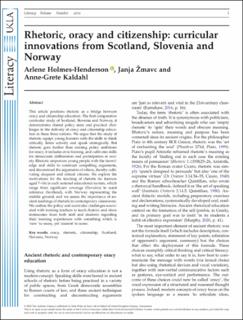Rhetoric, oracy and citizenship: Curricular innovations from Scotland, Slovenia and Norway
Peer reviewed, Journal article
Published version
Permanent lenke
https://hdl.handle.net/11250/3046297Utgivelsesdato
2022Metadata
Vis full innførselSamlinger
Sammendrag
This article positions rhetoric as a bridge between oracy and citizenship education. The first comparative curricular study of Scotland, Slovenia and Norway, it demonstrates shared policy aims and practical challenges in the delivery of oracy and citizenship education in these three nations. We argue that the study of rhetoric equips young learners with the skills to think critically, listen actively and speak strategically. But rhetoric goes further than existing policy ambitions for oracy; it includes civic training, and cultivates skills for democratic deliberation and participation in society. Rhetoric empowers young people with the knowledge and skills to construct compelling arguments, and deconstruct the arguments of others, thereby cultivating eloquent and critical citizens. We explore the motivations for the teaching of rhetoric (to learners aged 7–16) in each national educational system, which range from significant coverage (Slovenia) to scant reference (Scotland), with Norway representing the middle ground, and we assess the importance of ancient teachings of rhetoric in contemporary classrooms. We outline the policy and curricular challenges associated with training teachers to teach rhetoric and share testimonies from both staff and students regarding their learning experiences with something which is ‘new’ to many, yet ‘ancient’ to some.

